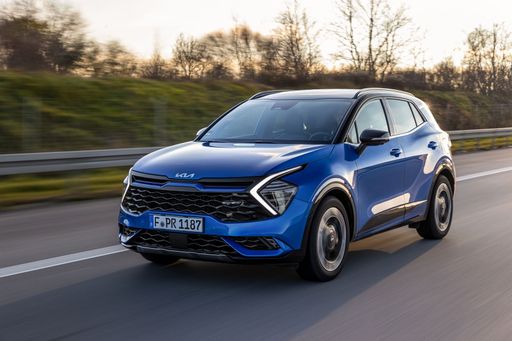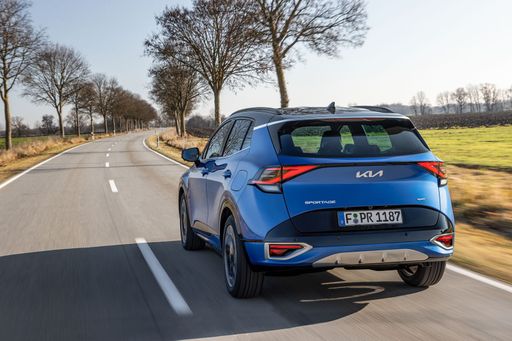Kia Sportage vs Toyota Yaris - Differences and prices compared
Costs and Efficiency:
When it comes to price and running costs, the biggest differences usually appear. This is often where you see which car fits your budget better in the long run.
Toyota Yaris has a evident advantage in terms of price – it starts at 21900 £, while the Kia Sportage costs 30200 £. That’s a price difference of around 8305 £.
Fuel consumption also shows a difference: Toyota Yaris manages with 3.80 L and is therefore noticeable more efficient than the Kia Sportage with 5 L. The difference is about 1.20 L per 100 km.
Engine and Performance:
Power, torque and acceleration say a lot about how a car feels on the road. This is where you see which model delivers more driving dynamics.
When it comes to engine power, the Toyota Yaris has a slightly edge – offering 280 HP compared to 239 HP. That’s roughly 41 HP more horsepower.
In acceleration from 0 to 100 km/h, the Toyota Yaris is clearly quicker – completing the sprint in 5.50 s, while the Kia Sportage takes 7.90 s. That’s about 2.40 s faster.
In terms of top speed, the Toyota Yaris performs a bit better – reaching 230 km/h, while the Kia Sportage tops out at 203 km/h. The difference is around 27 km/h.
There’s also a difference in torque: Toyota Yaris pulls to a small extent stronger with 390 Nm compared to 320 Nm. That’s about 70 Nm difference.
Space and Everyday Use:
Cabin size, boot volume and payload all play a role in everyday practicality. Here, comfort and flexibility make the difference.
Seats: offers more seating capacity – vs .
In curb weight, Toyota Yaris is decisively lighter – 1090 kg compared to 1552 kg. The difference is around 462 kg.
In terms of boot space, the Kia Sportage offers decisively more room – 587 L compared to 286 L. That’s a difference of about 301 L.
In maximum load capacity, the Kia Sportage performs significantly better – up to 1776 L, which is about 841 L more than the Toyota Yaris.
When it comes to payload, Kia Sportage hardly perceptible takes the win – 580 kg compared to 525 kg. That’s a difference of about 55 kg.
Who wins the race?
The Toyota Yaris proves to be leaves the rival little chance and therefore becomes our DriveDuel Champion!
Toyota Yaris is the better all-rounder in this comparison.
 @ Toyota Motor Corporation
@ Toyota Motor Corporation
Toyota Yaris
Costs and Consumption
View detailed analysis
Engine and Performance
View detailed analysis
Dimensions and Body
View detailed analysis
Kia Sportage
The Kia Sportage proves you don't have to choose between style and sensible family motoring, wrapping modern, confident looks around a roomy, well-equipped cabin. It's an easy car to live with — comfortable on daily runs, pleasantly engaging when you want a bit of fun, and kind to your wallet so you can keep smiling at the fuel pump.
details @ Kia Corporation
@ Kia Corporation
 @ Kia Corporation
@ Kia Corporation
 @ Kia Corporation
@ Kia Corporation
 @ Kia Corporation
@ Kia Corporation
Toyota Yaris
The Toyota Yaris is a sprightly city hatch that packs clever packaging, surprising comfort and fuel-sipping manners into a neat, easy-to-park package. It rewards sensible buyers with low running costs, friendly ergonomics and a forgiving drive, delivered with Japanese reliability and just enough personality to make errands feel a little less ordinary.
details @ Toyota Motor Corporation
@ Toyota Motor Corporation
 @ Toyota Motor Corporation
@ Toyota Motor Corporation
 @ Kia Corporation
@ Kia Corporation
|
 @ Toyota Motor Corporation
@ Toyota Motor Corporation
|
|
|
|
Costs and Consumption |
|
|---|---|
|
Price
30200 - 43900 £
|
Price
21900 - 46700 £
|
|
Consumption L/100km
5 - 7.9 L
|
Consumption L/100km
3.8 - 9.5 L
|
|
Consumption kWh/100km
-
|
Consumption kWh/100km
-
|
|
Electric Range
-
|
Electric Range
-
|
|
Battery Capacity
-
|
Battery Capacity
-
|
|
co2
132 - 180 g/km
|
co2
87 - 215 g/km
|
|
Fuel tank capacity
52 - 54 L
|
Fuel tank capacity
36 - 50 L
|
Dimensions and Body |
|
|---|---|
|
Body Type
SUV
|
Body Type
Hatchback
|
|
Seats
5
|
Seats
4 - 5
|
|
Doors
5
|
Doors
3 - 5
|
|
Curb weight
1552 - 1733 kg
|
Curb weight
1090 - 1356 kg
|
|
Trunk capacity
526 - 587 L
|
Trunk capacity
141 - 286 L
|
|
Length
4540 mm
|
Length
3940 - 3995 mm
|
|
Width
1865 mm
|
Width
1745 - 1805 mm
|
|
Height
1645 mm
|
Height
1455 - 1500 mm
|
|
Max trunk capacity
1715 - 1776 L
|
Max trunk capacity
935 L
|
|
Payload
543 - 580 kg
|
Payload
289 - 525 kg
|
Engine and Performance |
|
|---|---|
|
Engine Type
Petrol, Full Hybrid, Diesel MHEV
|
Engine Type
Full Hybrid, Petrol
|
|
Transmission
Manuel, Automatic
|
Transmission
Automatic, Manuel
|
|
Transmission Detail
Manual Gearbox, Dual-Clutch Automatic, Automatic Gearbox
|
Transmission Detail
CVT, Manual Gearbox, Automatic Gearbox
|
|
Drive Type
Front-Wheel Drive, All-Wheel Drive
|
Drive Type
Front-Wheel Drive, All-Wheel Drive
|
|
Power HP
136 - 239 HP
|
Power HP
116 - 280 HP
|
|
Acceleration 0-100km/h
7.9 - 11.6 s
|
Acceleration 0-100km/h
5.5 - 9.7 s
|
|
Max Speed
180 - 203 km/h
|
Max Speed
175 - 230 km/h
|
|
Torque
250 - 320 Nm
|
Torque
390 Nm
|
|
Number of Cylinders
4
|
Number of Cylinders
3
|
|
Power kW
100 - 176 kW
|
Power kW
85 - 206 kW
|
|
Engine capacity
1598 cm3
|
Engine capacity
1490 - 1618 cm3
|
General |
|
|---|---|
|
Model Year
2025
|
Model Year
2024 - 2025
|
|
CO2 Efficiency Class
F, D, E, G
|
CO2 Efficiency Class
B, G
|
|
Brand
Kia
|
Brand
Toyota
|
Is the Kia Sportage offered with different drivetrains?
The Kia Sportage is offered with Front-Wheel Drive or All-Wheel Drive.
The prices and data displayed are estimates based on German list prices and may vary by country. This information is not legally binding.
